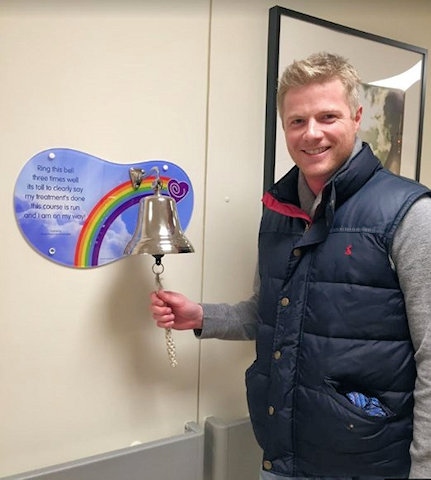Boys in Year 8 to be offered HPV jab for first time from September
Date published: 10 July 2019

Steve Sweeney was diagnosed with vocal cord cancer in 2015
From September this year, boys in school year 8 will be offered the free Human Papilloma Virus (HPV) vaccine for the first time.
Estimates suggest that the HPV vaccine programme will lead to the prevention of over 64,000 cervical cancers and nearly 50,000 non-cervical cancers by 2058.
Steve Sweeney, 43, was diagnosed with vocal cord cancer in 2015. He’s delighted that his son, who is about to go into year 8, will be offered the HPV vaccine.
He said: “You get the sledgehammer which is the diagnosis and it’s incredibly tough to take. It has a big impact on every aspect of your own life as well as your friends and family. Everyone needs to adjust.
“We all know how serious HPV is and, as a parent who has been through it, it’s wonderful to know that my son will now get the protection that I didn’t and that his chances of suffering from a range of cancers are now significantly reduced.
“Vaccines are crucial; they’re a no brainer. We’re lucky that we can protect ourselves and our families against preventable illnesses. Why wouldn’t you want to do that for your family?”
Siobhan Farmer, Screening and Immunisation Lead at PHE North West, said: “This universal programme offers us the opportunity to make HPV-related diseases a thing of the past and build on the success of the girls’ programme.
“Offering the vaccine to boys will not only protect them but will also prevent more cases of HPV related cancers in girls and reduce the overall burden of these cancers in both men and women in the future.
“I encourage all parents of eligible boys and girls to make sure they take up the offer for this potentially life-saving vaccine.
“It’s important not to delay vaccination, as the vaccine may be less effective as adolescents get older.”
Worldwide, about 5% of all cancers are linked to the HPV virus. This includes cervical, penile, anal and genital cancers and some cancers of the head and neck – all of which the vaccine helps to protect against.
Cervical cancer is currently the most common cancer in women under 35, killing around 850 women each year.
HPV is thought to be responsible for more than 90% of cervical cancers, as well as 90% of anal, about 70% of vaginal and vulvar cancers and more than 60% of penile cancers.
Modelling produced by the University of Warwick estimates that by 2058 the HPV vaccine currently being used may have prevented up to 64,138 HPV-related cervical cancers and 49,649 other HPV-related cancers.
This would be 50 years after the introduction of the HPV vaccination programme, when people who were vaccinated as teenagers have reached the age groups that they would typically be affected by HPV related cancers.
Public Health Minister Seema Kennedy said: "The success of the HPV vaccine programme for girls is clear and by extending it to boys we will go a step further to help us prevent more cases of HPV-related cancer every year.
“Through our world-leading vaccination programme, we have already saved millions of lives and prevented countless cases of terrible diseases. Experts predict that we could be on our way toward eliminating cervical cancer for good.
“Programmes like this are at the heart of our work to help people live longer, healthier lives through the NHS Long Term Plan and I would encourage everyone who is eligible to take up this potentially life-saving vaccine."
Girls have been offered the human papilloma virus (HPV) vaccine free from the NHS since 2008. So far, ten million doses of HPV vaccine have been given to young women in this country meaning over 80% of women aged 15-24 have received the vaccine.
Since the introduction of HPV vaccination, infections of some types of HPV (HPV 16/18) in 16-21-year-old women have reduced by 86% in England. A Scottish study also showed that the vaccine has reduced pre-cancerous cervical disease in women by up to 71%.
Similarly, diagnoses of genital warts have declined by 90% in 15-17-year-old girls and 70% in 15-17-year-old boys due to the HPV vaccine.
Parents of girls and boys aged 12 and 13 should look out for information from their children’s school about the vaccine and timings for the jab.
If they miss out on the vaccination for any reason, they should talk to their school nurse/immunisation team about getting the vaccine at a later date.
Do you have a story for us?
Let us know by emailing news@rochdaleonline.co.uk
All contact will be treated in confidence.
Most Viewed News Stories
- 1Newhey's Char Steakhouse and Bank Chamber close with immediate effect
- 2Two men arrested after police chase ends up in Middleton river
- 3Six men arrested in Rochdale child exploitation investigation
- 4Man charged in connection with assault on Christmas Eve in Sudden
- 5Six men charged in connection with child exploitation investigation
To contact the Rochdale Online news desk, email news@rochdaleonline.co.uk or visit our news submission page.
To get the latest news on your desktop or mobile, follow Rochdale Online on Twitter and Facebook.


